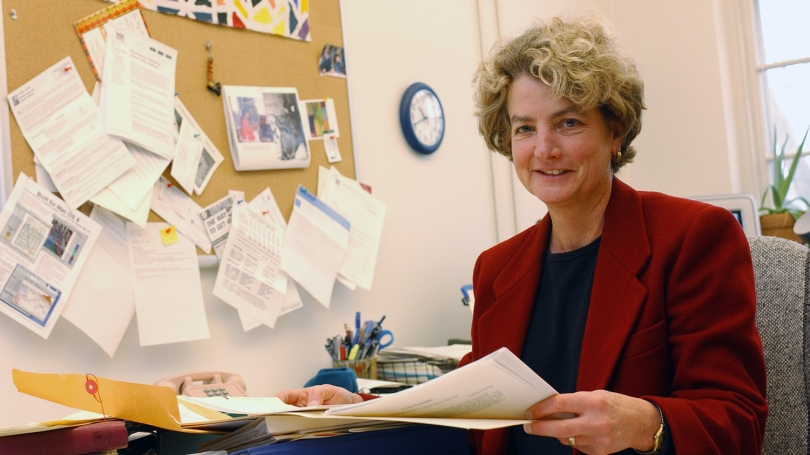
- About
- Undergraduate
- Graduate
- Foreign Study
- Research
- News & Events
- People
Back to Top Nav
Back to Top Nav
Back to Top Nav
Back to Top Nav
Back to Top Nav
Our Friend Deb Nichols
Deborah (Deb) L. Nichols, William J. Bryant 1925 Professor of Anthropology, passed away on Wednesday, July 27. She was 70 years old.
It's incredibly difficult to lose a member of our community, especially one so present and welcoming as Deb. Deb was a kind and generous soul, an exceptional teacher-scholar of Mesoamerican and Native American archaeology, and a leading voice for anthropological issues on the national and international stage. Her reputation preceded her, and she was responsible for teaching, encouraging, and mentoring scores of students over her 37 years at the College. She was especially committed to making archaeology a place for Native students; training the next generation of Mexican archaeologists in Mexico; and, above all, mentoring women to succeed academically and professionally.
Deb was born in Flushing Meadows, NY on April 17, 1952. She began her studies in anthropology at Case Western Reserve University (1970–1972) before transferring to the Pennsylvania State University to complete her bachelor's degree in Anthropology (1973), her master's (1975), and her PhD (1980). She served as assistant director of the Black Mesa Archaeological Project and an adjunct assistant professor of anthropology at Southern Illinois University (1981–1985) until joining the Department of Anthropology at Dartmouth as an assistant professor in 1985. Deb was promoted to associate professor with tenure in 1990, and she was promoted to full professor in 1996.
Deb's research focused largely on the emergence and development of complex societies in Mesoamerica and the US Southwest, exploring issues surrounding urbanism, ecology, craft production, and exchange. She is particularly well known for her long research into ancient Aztec communities of central Mexico, as well as her more recent archaeological field- and lab-based investigations as part of the Altica Project in the Teotihuacan Valley on one of the earliest farming villages there.
At Dartmouth, Deb taught many popular courses in Anthropology, Latin American, Latino and Caribbean Studies, and Native American and Indigenous Studies, including "Ancient Native Americans," "The Aztecs," and "Ecology, Culture and Environment." Deb also co-taught a Dean of Faculty Innovative Course, "Who Owns the Past?", with Roger Ulrich (Classics). Julie Hruby (Classics) and Jesse Casana (Anthropology) also co-teach this popular course, and Deb and Julie won the Apgar Award for Innovation in Teaching in 2015.
Deb's formal course offerings do little to capture the many reading and research independent study courses, undergraduate honors theses, and MALS masters theses that she directed and advised over the years. Deb's students recall fondly her enthusiasm and encouragement as well as the way she used her field experience to explore both specific and conceptual questions around the subjects at hand. Many of her students have gone on to successful careers in archaeology and related fields. Deb published extensively in her field. Her most recent edited book projects focused on the Aztecs (Rethinking the Aztec Economy [2017] and Oxford Handbook of the Aztecs [2017]), but she also edited and contributed to nine books related to Mesoamerica. Deb authored over 100 articles, on topics such as "City, State, and Hinterlands: Teotihuacan and Central Mexico" (2020), "A Geospatial Approach to the Development of Postclassic Markets: Ceramic Production and Exchange from the Epiclassic through Late Postclassic in the Basin of Mexico," (2018), and "Civil Engineering and Ceremonial Space at Teotihuacan, Mexico," (2015). With 17 book reviews, over 90 invited lectures, 18 conferences or symposia organized, and 14 research reports, Deb was deeply engaged in her broader scholarly community.
Deb was a prominent advocate for archaeology, the preservation of cultural heritage, and engagement with Indigenous communities in Mexico and the United States. She served on numerous key committees with the Society for American Archaeology (SAA), the primary professional organization for archaeologists in the country, and was president of the SAA from 2021 until her death.
Deb was also deeply engaged with her Dartmouth community. In addition to her courses, the many students that she mentored as Women in Science Program interns, presidential scholars, undergraduate honors thesis writers, and undergraduate, graduate, and post-doctoral advisees, Deb performed extensive service for the College. She served as chair of Anthropology from 2002–2003, 2005–2006, and 2009–2011, and as chair of LALACS from 2015–2018. She also served on the Committee Advisory to the President both as vice-chair and member (2003–2006, 2008–2008–2015, 2018–2020). She was a member of the Committee on Organization and Policy (2000–2001), the Committee on Priorities (2006–2009), and a variety of other standing and ad hoc committees, including the Ad Hoc Committee to Review the Curriculum (1990–1992) that established the College's current undergraduate curriculum, and on the Dartmouth College Board of Trustee's Committee on the Student Life Initiative (1999–2000). Deb served on multiple search committees for faculty members, center directors, the dean of the College, and the provost, and sat on a number of steering committees, including those for Native American Studies (2001–2002) and LALACS (2001–2002). Her contributions were many, wide-reaching, and lasting.
Deb is survived by her husband of nearly 32 years, Professor John Watanabe, and their son, Aaron. The family asks that, in lieu of flowers, you might consider making a donation to the Upper Valley Humane Society (where Deborah got her first Dartmouth dog, Peabody), to the Jack Byrne Center at Dartmouth Hitchcock Medical Center (where she spent her last days in the peace of fresh air and a visiting woodchuck—tenacious digger like the archaeologist she was—and a hummingbird, avatar of the Aztec tribal god Huitzilopochtli), or send maple bacon crullers from Lou's to the nurses of ICU South or ISCU at DHMC who cared for Deb as one of their own.